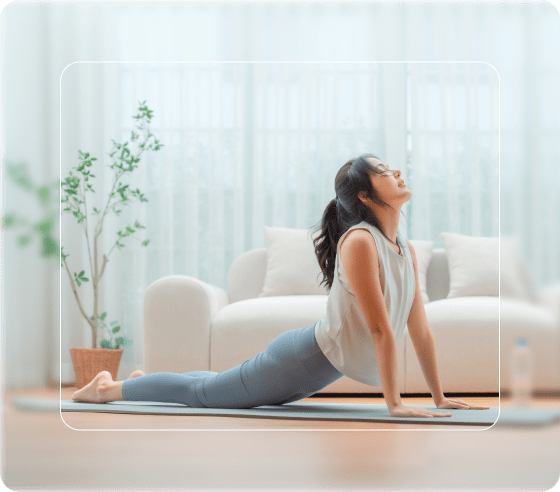Improve Your Mental Health with Lifestyle Psychiatry
Explore how lifestyle psychiatry can help you create lasting changes for a healthier, more balanced life.

Lifestyle Psychiatry: A Whole-Person Approach to Mental Health
Mental health isn’t just about treating symptoms—it’s about understanding how your daily habits shape your well-being. Lifestyle psychiatry goes beyond traditional medication-focused care by addressing the core areas that impact your mental health: sleep, nutrition, movement, and stress management.

Key Lifestyle Psychiatry Practices
Sleep and Mental Health
While your body rests and recovers during sleep, it’s also the time your brain gets the essential repair and reset it needs. During sleep, your brain performs important tasks like processing emotions, consolidating memories, and clearing out toxins through the glymphatic system (a network of vessels in the brain that helps remove waste products and toxins, similar to how the lymphatic system works in the rest of the body). Getting quality sleep not only leaves you feeling refreshed, you’re also strengthening your brain’s ability to handle stress, regulate emotions, and maintain mental clarity.
Poor sleep does more than just leave you feeling tired; it can significantly impact your mental health. Chronic sleep disruption can increase anxiety, worsen depression symptoms, and make it harder to cope with daily stressors. The relationship works both ways. Mental health challenges often disrupt sleep, creating a cycle that can be difficult to break without intervention.

The science is clear: optimizing your sleep is one of the most powerful ways to enhance mental wellness. During sleep phases, your brain repairs cellular damage, balances neurotransmitters, and regulates hormones like cortisol that affect mood and stress response. The hours between 10PM and 2AM are particularly important, which is why timing your sleep is as important as the duration.
Creating an environment and routine that supports quality sleep can transform your mental health. This means paying attention to your body’s natural rhythms (your chronotype) and making intentional choices about when and how you prepare for rest. Small changes in your sleep habits can lead to significant improvements in emotional resilience, cognitive function, and overall mental well-being.
Tips for Better Sleep
Optimize Your Sleep Environment
- Keep bedroom temperature between 60-67°F
- Use blackout curtains for complete darkness
- Consider white noise for consistent sound
- Invest in a comfortable mattress and pillows
Develop a Relaxing Bedtime Routine
- Power down screens 1 hour before bed
- Practice gentle stretching or meditation
- Try calming activities like reading or journaling
- Maintain consistent sleep and wake times, even on weekends
Support Natural Sleep Chemistry
- Get morning sunlight exposure
- Use blue light blocking glasses in the evening
- Consider natural sleep supports like magnesium glycinate
- Avoid caffeine after 2 PM
Signs Your Sleep Needs Attention:
- Difficulty falling or staying asleep
- Waking up feeling tired or drained
- Mid-day energy crashes
- Increased irritability or anxiety
- Trouble concentrating

Exercise for Mental Health
Movement is medicine for your mind. When you engage in physical activity, your brain receives an immediate boost in blood flow and oxygen, triggering the release of powerful mood-enhancing chemicals. This natural process helps sharpen focus, lift mood, and reduce anxiety. Think of movement as your brain’s natural energy drink, providing sustained mental clarity without the crash.
The connection between movement and mental health runs deep at a cellular level. Physical activity stimulates your mitochondria – the tiny powerhouses in your cells – to produce more energy, directly impacting your mental stamina and emotional resilience. For those with genetic variations affecting BDNF (Brain-Derived Neurotrophic Factor), regular movement becomes even more important, acting as a powerful tool for supporting brain health and mood regulation.
Research shows that different types of movement offer unique mental health benefits. Low-intensity activities like walking or gentle yoga can calm your nervous system and reduce anxiety, while strength training builds both physical and mental resilience. Cardio exercises provide an immediate boost to brain function, enhancing memory, focus, and cognitive flexibility. The key isn’t just moving. It’s finding the right mix of activities that energize both your body and mind.
Creating a sustainable movement practice isn’t about intense workouts or strict routines. It’s about consistent, enjoyable activity that fits your lifestyle. Whether you’re dealing with depression, anxiety, or just seeking better mental clarity, regular movement can be transformative. The goal is to build a relationship with movement that energizes rather than depletes, supporting your mental health journey for the long term.
How Movement Supports your Mental Health
- Improved mood
- Better stress management
- Clearer thinking
- More stable energy levels
- Enhanced sleep quality
- Reduced anxiety symptoms


Nutrition for Mental Health
What you eat has a powerful impact on your mental health. Our nutrition approach focuses on:
- Reducing Inflammation: Supporting emotional balance with anti-inflammatory foods and eating patterns.
- Boosting Brain Health: Providing nutrients that enhance focus, mood, and mental clarity.
- Optimizing Gut-Brain Connection: Strengthening the link between gut health and emotional well-being.
- Stabilizing Blood Sugar: Promoting steady energy and mood regulation.
See our Nutrition for Mental Health Page for more information.
Building Emotional Resilience
Stress is a part of life, but it doesn’t have to control your well-being. We help you build emotional resilience and regain balance through a combination of proven techniques and personalized strategies:
- Mindfulness Practices: Evidence-based tools to help you stay grounded, reduce anxiety, and improve focus.
- Breathing Techniques: Simple, effective methods to calm your nervous system and regain control in challenging moments.
- Cognitive Reframing: Shift negative thought patterns into productive, empowering perspectives.
- Lifestyle Structure: Establish routines and habits that provide stability and reduce overwhelm.
- Psychotherapy: Address the deeper patterns and root causes behind your stress, creating a foundation for lasting change.
Visit our Stress Resilience Page for actionable insights and resources to help you thrive.

Frequently Asked Questions
What is Lifestyle Psychiatry, and how is it different from traditional care?
Lifestyle Psychiatry takes a whole-person approach to mental health by addressing how lifestyle factors—like sleep, nutrition, movement, and stress—affect your well-being. Unlike traditional care that often focuses primarily on medication, lifestyle Psychiatry looks at the root causes of mental health challenges. This approach helps create lasting change by treating the whole person, not just the symptoms.
How does the Bliss Protocol work within Lifestyle Psychiatry?
The Bliss Protocol starts with a comprehensive evaluation of your overall health—everything from sleep patterns and diet to stress levels and daily habits. Based on these insights, we design a personalized plan that may include strategies like targeted supplementation, movement recommendations, sleep optimization, and traditional psychiatric care when needed. You’ll also receive ongoing support to adapt your plan as you progress.
How quickly can I expect results?
Many people notice improvements in energy, mood, and focus within 2–4 weeks of starting their personalized plan. However, deeper, lasting changes—such as improved sleep, reduced stress, and emotional balance—typically develop over 3–6 months as healthier habits take root.
Do I need to stop taking my current medications to try Lifestyle Psychiatry?
No, you don’t have to stop your current medications. Lifestyle psychiatry works alongside your existing treatments. If adjustments to your medications are needed, they will only be made under careful supervision and with your input, ensuring that you feel supported every step of the way.
Can lifestyle changes really help with insomnia?
Research shows that small adjustments, like reducing screen time before bed, managing stress, and establishing a consistent bedtime routine, can greatly improve sleep quality. Lifestyle psychiatry focuses on addressing these underlying factors to help you achieve restorative sleep naturally.
Why focus on lifestyle factors for mental health?
Your mental health is closely linked to your daily habits. Poor sleep, chronic stress, or imbalanced nutrition can all worsen symptoms of anxiety, depression, or other challenges. By optimizing these key areas, Lifestyle psychiatry creates a foundation for sustainable mental wellness.
Is Lifestyle Psychiatry backed by research?
Yes! Studies consistently show that improving sleep, nutrition, physical activity, and stress management can reduce symptoms of depression and anxiety, boost cognitive function, and enhance overall quality of life. Our approach is rooted in evidence-based practices tailored to your unique needs.
How can I get started with Lifestyle Psychiatry?
Start by scheduling a consultation. During your first session, we’ll take a deep dive into your health history, daily habits, and current challenges to create a personalized plan that sets you on the path to feeling better.
